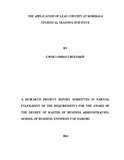| dc.description.abstract | The service sector contributes a great deal to the economy of any country’s Gross
Domestic Product. In Kenya, the education sector alone contributes a great deal to GDP.
At the same time, massive resources are invested to the same sector. Kenya’s Vision 2030
indicates government’s expenditure on education is equivalent to 7.0% of the country’s
GDP. This translates into one of the highest expenditure levels per student out of the
education GDP in Africa. As the total expenditure for education rises, other challenges
like improving the overall efficiency of the sector come to the fore. This amount of
resources expended to the sector, forms the basis for this research inquiry into the TIVET
sub-sector in a technical training institution with an aim of determining the extent to
which lean concept, as a management tool, is applied to eliminate wastes at Mombasa
Technical Training Institute. Lean thinking has been widely used in the manufacturing
sector and now is getting increasingly useful in the service industry. A detailed literature
review was done that revealed the use of lean concept in other sectors. A case study
methodology was used in which the heads of departments at the institute were interviewed
to obtain the required data. A case study methodology is of particular relevance in new or
emerging situations where not much is known about the particular area under study.
Content analysis was used to analyze the data that was collected. This project’s findings
indicated that indeed there are various types of wastes in the TIVET education programs
that led to inefficiency in the system. The discussions in content analysis however,
revealed the application of lean concept to a considerable extent at the institute thereby
answering the research question, though direct reference was not made to lean concept
itself. Recommendations to managers in the service industry as well as policy makers
include reducing waiting time for examination results and reviewing the curriculum to
make the content manageable within a given period. | en_US |

